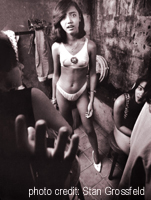|
|
|
About
Us
Cambridge Documentary Films produced the documentary, "Rape is…," as one
part of the global effort to stop rape in all of its complex forms, and
to bring an end to a human rights outrage that directly threatens millions
of women, children and men throughout the world.
This is not the first film we have made about rape. In 1975 we produced
"Rape Culture", which showed how "rapist" behavior is encouraged by entertainment,
advertising, and male dominated political, moral and cultural organizations
in American society. We see "Rape Is…" as a necessary updating of "Rape
Culture" and a new attempt at creating a fundamental change at how we
perceive sexual assault.
Making films that are truly useful for people interested in social change
and social justice requires that a film inspires people to think, react,
discuss and act. Many years of producing films used as part of the efforts
of educators and activists have taught us that films need to be short
enough so that there is time for people to discuss the ideas that the
film presents. For filmmakers, this makes for a challenging editing process,
but we know that the most important thing is not our film, but the discussion
and reaction of the viewers that the film provokes. Through discussion
and reflection, people become aware of what they believe about the issues
and what is important to them. The participation of activists and educators
who can connect people with organizations and resources that relate to
their interests is critical to this process.
We designed this website to help do that. The first menu in the website
asks people to select a direction and, of course, the first category that
can be selected is for people who have been raped or want to help people
they know who have been raped. It is a list of hotlines and support services
that we know have been around for a while and hopefully will stay funded
in the future. Please help us keep this section up to date and tell us
if any links or phone numbers do not work or if you have a positive or
negative reaction to any of the services at webmaster@rapeis.org.
The next direction presents organizations resources, readings, listserves,
online courses and papers in all of the many areas that the film covers.
It asks, for example, if you want to learn more about international human
rights activities, or child abuse, or clergy abuse, or campus rape, or
the relationship between rape and sex trafficking and prostitution, or
prison rape, just to name a few of the many categories covered. We hope
that this is where people begin to make the issue of rape their own, by
connecting with organizations or learning about the specific areas that
interest them and discovering what they can do. The resources here are
designed to help individual viewers pursue their interests and to help
discussion facilitators link audience members with their interests. Again
please email us with new resources or comments on the ones we have listed.
The final direction is for people who want to organize a stop rape event
at their organization of campus. We have some suggestions and look forward
to putting up others.
Margaret Lazarus
Sarah Anne Ledoux
Laura
Mason
Renner Wunderlich
For Cambridge
Documentary Films
|
|

The
U.S. State Department estimates that at least 700,000 persons are trafficked
within or across international borders every year, and that each year
at least 50,000 women and girls are trafficked into the United States.
|


